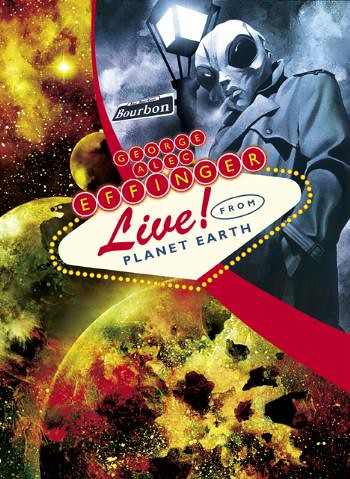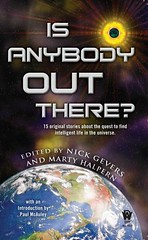 |
| Card #5 Photo by Ross Pavlac |
Back in the day, when I was acquiring and editing for Golden Gryphon Press, I put together three collections of fiction by author George Alec Effinger. Initially, I worked with GAE on the contents of the first book, Budayeen Nights , but he passed away in April 2002, more than a year before this first collection finally saw publication in September 2003. Two more collections followed: George Alec Effinger Live! from Planet Earth
, but he passed away in April 2002, more than a year before this first collection finally saw publication in September 2003. Two more collections followed: George Alec Effinger Live! from Planet Earth (2005) and A Thousand Deaths
(2005) and A Thousand Deaths (2007).
(2007).
In 2009, I wrote a series of three lengthy blog posts, detailing how these three books came about. Then, in honor of what would have been George's 66th birthday, on January 10, 2013, I republished the series of three blog posts. I am always hopeful that new readers will discover the work of George Alec Effinger.
But what is behind this current blog post is the "card" pictured above: Card #5 in the series of collectible cards produced by the Chicago in 2000 Committee, that is, the Chicon 2000 WorldCon.
 |
| Card #5, back |
While I was working on the three GAE books for Golden Gryphon Press, I pretty much lived online for days on end trying to find everything and anything pertaining to George Alec Effinger. During my research I learned that he was a die-hard fan of the Cleveland Indians baseball team -- and I also found the card photo above pictured on the Chicon 2000 website.
Knowing what a huge fan of the Cleveland Indians GAE was, I wanted to use the base photo (without the overlaid text) for the dust jacket photo for Live! From Planet Earth. On the Chicon 2000 website, the photographer's name, Ross Pavlac, was linked at the bottom of the page. Sadly, when I clicked on the link, I learned that Ross had passed away in 1997. The obit and appreciations on the page mentioned Ross's wife, Maria Pavlac. Keep in mind this was at least ten years ago, and searching online then wasn't as easy as it is today. Facebook didn't launch until 2004, and Twitter two years later. I don't seem to have any emails on file, but if my memory serves, I did find an email addy for a "Maria Pavlac," whom I contacted, seeking permission to use the GAE photo. Unfortunately, I never received any response, so I may not have had the correct "Maria Pavlac." Regardless, all three Effinger books were published, but no dust jacket included this particular photo.
Knowing what a huge fan of the Cleveland Indians GAE was, I wanted to use the base photo (without the overlaid text) for the dust jacket photo for Live! From Planet Earth. On the Chicon 2000 website, the photographer's name, Ross Pavlac, was linked at the bottom of the page. Sadly, when I clicked on the link, I learned that Ross had passed away in 1997. The obit and appreciations on the page mentioned Ross's wife, Maria Pavlac. Keep in mind this was at least ten years ago, and searching online then wasn't as easy as it is today. Facebook didn't launch until 2004, and Twitter two years later. I don't seem to have any emails on file, but if my memory serves, I did find an email addy for a "Maria Pavlac," whom I contacted, seeking permission to use the GAE photo. Unfortunately, I never received any response, so I may not have had the correct "Maria Pavlac." Regardless, all three Effinger books were published, but no dust jacket included this particular photo.
Now, here it is more than ten years later, and I posted a comment to a Facebook post, and mentioned how I had been searching for the GAE Chicon 2000 card back in the early 2000s, and Steven Silver responds to my comment, telling me to provide him with my mailing address and he'll send me the GAE card. Which I did, and then he did. Not one, but four of the GAE cards!
Though the photo didn't make it onto one of the three GAE collections, I now have -- thanks to the kindness of Steven Silver -- card #5 to add to my George Alec Effinger collection.







